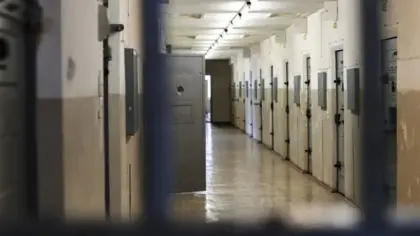The Russian news site Kommersant reported on Thursday, March 21 that an ombudsman for its Federal Penitentiary Service (FSIN) has reported that a number of prisons may have to close.
According to the report, the size of the prison population has decreased by 17.5 percent since the beginning of 2023, so a draft order for the possible liquidation of several institutions was being prepared.
JOIN US ON TELEGRAM
Follow our coverage of the war on the @Kyivpost_official.
Mark Denisov, Commissioner for Human Rights in the Siberian region of Krasnoyarsk said to a legislative assembly meeting on Thursday: “I note one alarming trend: a one-time large reduction in the number of convicts in the conditions of the special military operation prompted someone to report to the top about the need to close penitentiary institutions in order to optimize and save money – a number of institutions will be closed this year in our region.”
Vladimir Putin’s call for partial mobilization at the end of 2022 was highly unpopular and led to the mass exodus of thousands of military age men, forcing Russia to find alternative ways to boost its manpower. One solution lay in the recruitment of prisoners in exchange for a pardon, as trialed by Yevgeny Prigozhin’s Wagner group in the autumn of 2022 and now administered by Moscow’s own Ministry of Defense (RMoD).
An April 2023 report by the independent Russian media site Mediazona said that in 2022 Moscow’s penal colonies lost over 32,000 prisoners to the war, of which more than 20,000 were released during the height of the Wagner recruitment campaign between August and November of that year.

Zelensky Meets CIA Director William Burns in Ukraine
When the RMoD took responsibility for convict enlistment in early 2023, the FSIN stopped publishing the relevant data but had said that the prison population was around 433,000 in January 2023.
In October 2023 Russia’s then Deputy Justice Minister, Vsevolod Vukolov, said the number had dropped to 266,000 and asked the FSIN how many war recruits contributed to the drop. He was still waiting for an answer when a month later he was made Russia’s Ambassador to Gabon.
An Oct. 26 report in the Washington Post said that around 100,000 prisoners had gone to the war, the assessment based on prison numbers released prior to Russia’s full-scale invasion.
The Radio Free Europe / Radio Liberty (RFE/RL) Russian service reported that the Kremlin spokesman Dmitry Peskov had asked about the pardoning of criminals who fight, invoking a phrase reminiscent of that used by Josef Stalin for a similar situation during World War II: They can “atone for their crimes with blood on battlefields, in military units, under flying bullets and shells.”
As Kyiv Post reported earlier, the recruitment of prisoners will continue, although in a slightly amended form. Those recruited to fight will have their criminal case suspended or their prison sentence converted to a suspended sentence for the duration of their service. They would only be pardoned if they are considered to have served sufficiently well enough to receive a state award for valor.
Denisov considered the proposed prison closures to be extremely short sighted and “impractical,” according to a report in the Prospekt Mira news site saying: “The SVO [special military operation, Russia’s official euphemism for “war”] will end sooner or later. Everything will return to normal. After all, the social structure of society has not changed. In five years, we will have exceeded the limit of violations of the rights of convicts and will painfully, at exorbitant prices, [need to] open new penitentiary institutions.”
You can also highlight the text and press Ctrl + Enter






